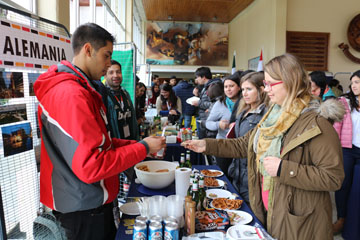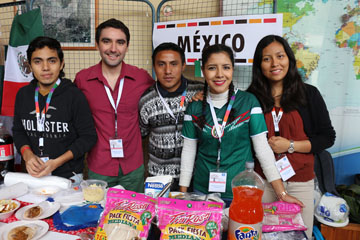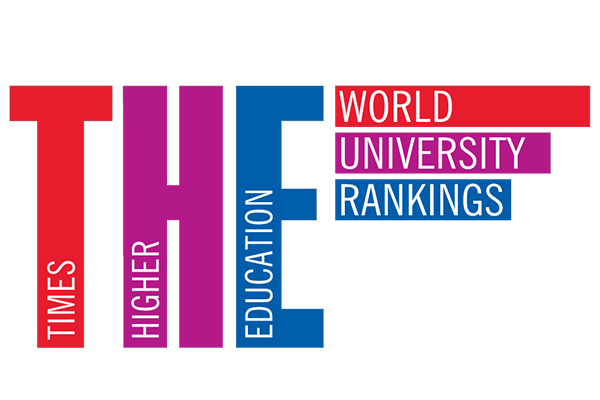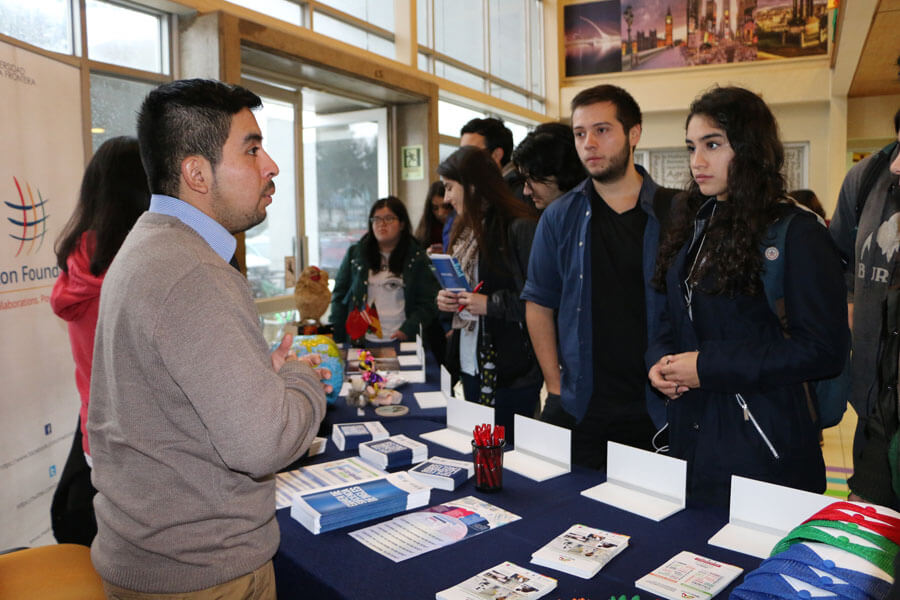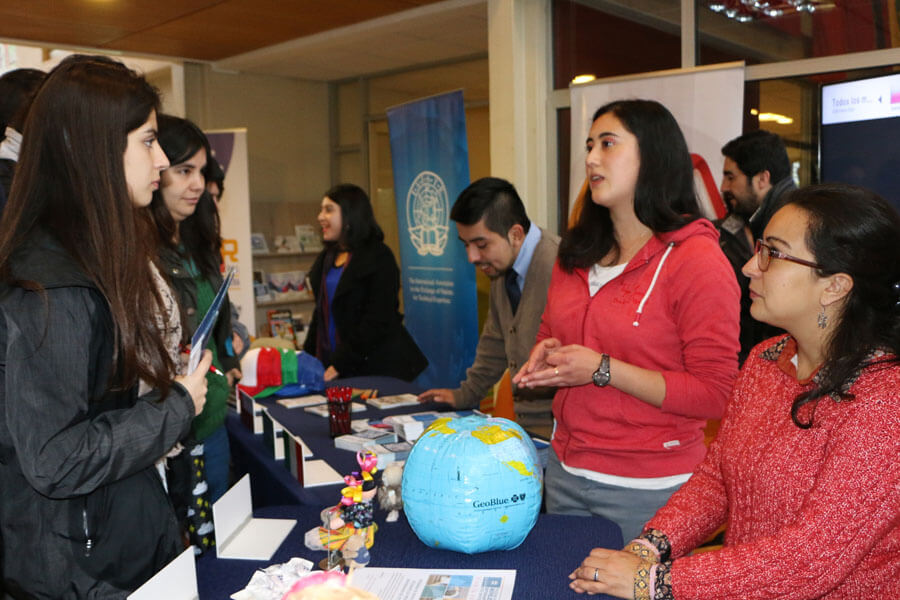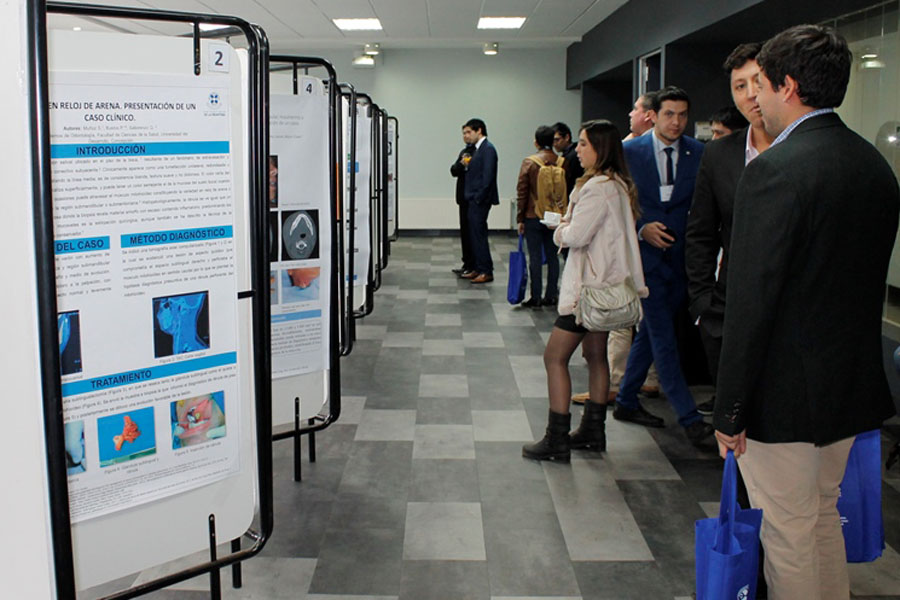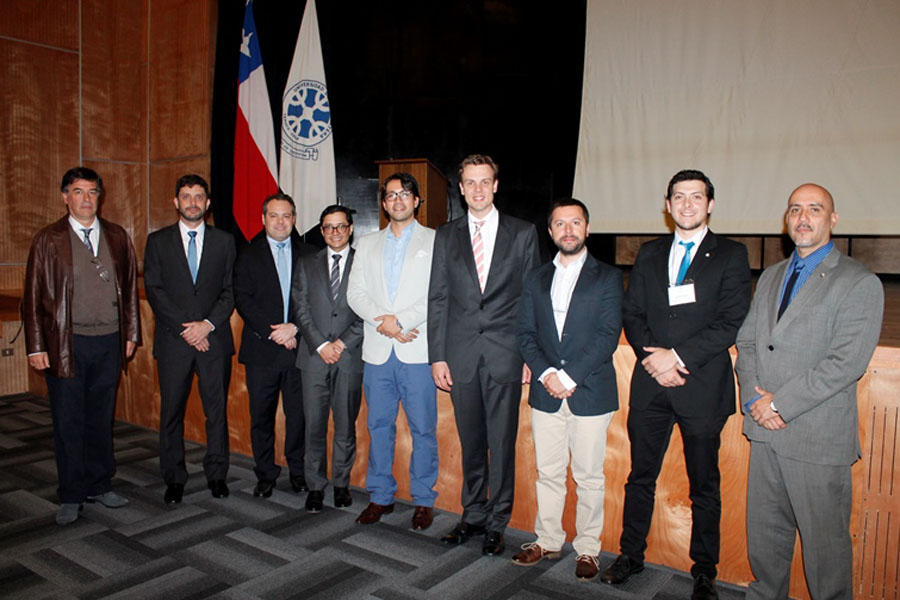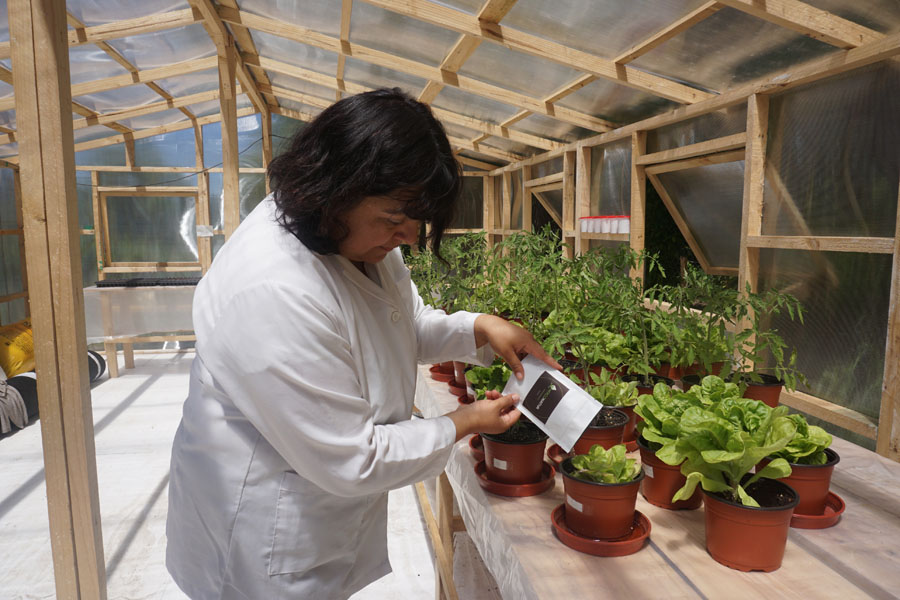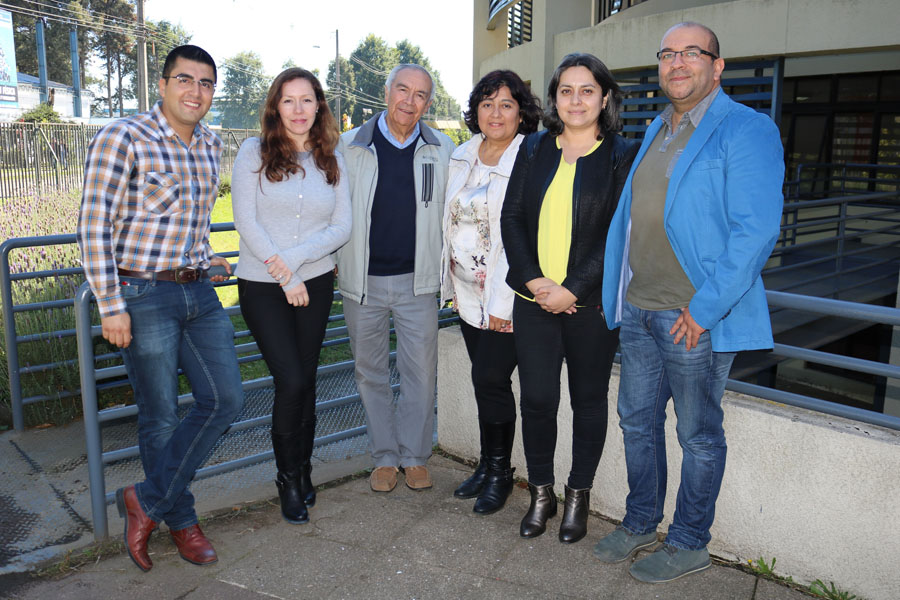|
The International Fair, organized by the Student Mobility Office, took place for the second year in a row. The purpose is to show the different countries and active agreements the UFRO has with higher education institutions on the five continents. |
Nowadays, it is possible to study abroad, but the decision about where to go might be difficult and confusing for a student. Therefore, the International Affair´s Office and National and International Student Mobility Office at the Universidad de La Frontera organized the second version of the International Fair together with the exchange students. This initiative started last year with the idea to show the different agreements and scholarship programs the UFRO has with different higher education institutions around the world and which allow the students of this University to spend a semester abroad. But also to show the international students who come to this University. The particular aim is to create a space where the students can exchange experiences and important aspects of their cultures, to bring traditions together and to present the world as they see it. The idea for the future is to carry out this fair each semester and to offer activities that inspire the students to participate and to strengthen relations. The director of the National and International Student Mobility Office, Antonia Espinoza, said that “the purpose of this event is that UFRO students who have been abroad and students from other countries come together and present the different cultures and food of their countries in one place.” The confluence of flavors, cultures and languages has been presented at 13 stands that included Belgium, Rumania, Lithuania, Brazil, Germany, Mexico, Spain, Peru and Colombia. The sponsors also created a stand with information about the sponsor program and the incorporation into the university community. Waffles with hazelnut cream and apple strudel (Germany), cepelinai (Lithuania), eggplant humus (Rumania) and stierenkloten (Belgium) were only some of the dishes the students prepared to offer a little tasting menu to the visitors of the fair. STUDENT EXPERIENCES One of the main desires of the students who want to study a semester abroad is to get to know traditions and people with other perspectives. The Mexican law student, Ariadna López, also had this dream when she took the challenge of studying at the UFRO for a semester. “I came to Temuco two months ago and the reception has been excellent. The Universidad de La Frontera gave me all the support I needed, on my arrival and during my stay. And also for the integration with the other students. I came here with the idea of learning as much as possible in order to make this experience absolutely worth it.” This first semester 40 students came to the UFRO and 30 went to study abroad. Both groups mobilized via the National and International Student Mobility Office. There are different alternatives for undergraduate students. For example, the ERASMUS scholarship was the option the civil engineering student, Gabriel Davidson, chose. “I went to the University of Castilla-La Mancha in Spain for a semester. My experience was positive because I was obliged to develop my English skills, since I had friends from Belgium, Germany, Ireland and Norway. The English language was a fundamental tool for being able to communicate with them.” Written by: Communications Division
|
|
The quality indicators of the Universidad de La Frontera have been analyzed by the prestigious THE international university rankings and place it among the top ten in Chile. |
The quality and performance of the Universidad de La Frontera are being recognized once again at the international level by the Times Higher Education Rankings, since it is positioned in the range 251-300 in the Emerging Economies University Rankings 2018 and in 10th place among the Chilean institutions. This ranking judges the 378 most important universities in 42 countries that are classified as Emerging Economies (advanced emerging, secondary emerging or frontier) by the FTSE. “We have to be proud that our University, the UFRO, is placed in this prestigious ranking, especially when we consider that only 13 Chilean universities managed to enter this analysis that judges the best institutions led by research among the nations with an emerging economy, which is an important and significant advance for our institution”, Sergio Bravo, the rector of the UFRO, emphasized. The rankings use the same 13 performance indicators as the THE World University Rankings to judge institutions on their main missions: teaching, research, knowledge transfer and international outlook. Therefore, the applied methodology has been carefully recalibrated to reflect the development characteristics and priorities of universities in emerging economies. For example, there is a special emphasis on the international outlook. SEE EMERGING ECONOMIES UNIVERSITY RANKINGS 2018 Written by: Dirección de Comunicaciones
|
|
On this occasion, the consortium officially launched English and German courses for students of the Faculty of Engineering and Science. |
Students of different study programs at the Universidad de La Frontera got to know the offer and opportunities of international mobility, employability, networking and global citizenship, etc., during the Language Exposition that was organized by the UFRO Macro Faculty of Engineering. The activity was organized with the participation of the Language Coordination Center (CODI), the International Affair´s Office, the Comprehensive Training and Employability Office (DIFEM), the Internship Unit of the Faculty of Engineering and Science, the Melton Foundation, IAESTE Chile and Temuco UniverCiudad (UniverCity). “We developed this exposition in cooperation with different units of our University and Institutions related to international student mobility, languages and international scholarships”, the executive director of the UFRO Macro Faculty of Engineering, Gonzalo Bravo, stated. “We showed our offer, so the students could clarify their doubts and express their interest in acquiring new competencies and the tools for new knowledge”, he added. On this occasion, Chilean and international students presented their experience in international mobility to the students who came to visit the exposition, which took place in the CODI Central Hall. In this regard, Guillermo Curiqueo, student in Telematics Engineering, said that “this is a very good initiative, since it is a very effective way to disseminate what is happening in our Faculty and University. I found out about the requirements to do my internship abroad, how to cover the costs and other related topics”, he said. At the same time, David Jara, student in Industrial Engineering with specialization in Computer Engineering, affirmed that “it is positive that this kind of expositions are being made, since they bring practical fields, languages and student mobility together, what gives us the opportunity to ask questions and to clarify our doubts. To count with the possibility to ask and get to know the experience of students who spent their internships, courses or semesters abroad increases the level of this activity”, he assured. ENGLISH AND GERMAN CLASSES On this occasion, the Macro Faculty of Engineering officially launched three English courses and one German course in cooperation with CODI, starting on May 2nd. The courses will be offered exclusively for students of the UFRO Macro Faculty of Engineering. “CODI develops these courses with experience and professionalism. This is why we want our students to keep improving their level of a second language”, the dean of the Faculty of Engineering and Science of the Universidad de La Frontera, Rodrigo Navia, stated. “Today, the engineering students of the UFRO live in a world where they have to know different languages, since this has a positive impact on the development of the competencies we want to promote”, he added. At the same time, the DIFEM UFRO director, Juan Méndez, emphasized the importance of learning a second language. “It is very important that we include the knowledge of other languages in the training, since it creates enormous possibilities that exist in today´s world, in which professionals can move in an uninhibited manner. English is a transversal language that brings nations together and is a tool to communicate with people from different countries. This is why it is essential that our engineers know and value the importance of this language”, he concluded. Written by: Mauricio Antivil
Engineering Project 2030 |
|
Complex Maxillofacial Surgery was the main topic of the event powered by the Faculty of Dentistry at the Universidad de La Frontera. |
The III. Symposium on Oral and Maxillofacial Surgery in the south of Chile was powered by the Faculty of Dentistry at the Universidad de La Frontera, which brought outstanding experts from Brazil, Spain and Chile together. The event that took place at the Aula Magna of the UFRO has been organized by the Oral and Maxillofacial Surgery Division and was oriented to professional dentists and dentistry students. In this regard, the director of the event, Dr. Sergio Olate, stated that “the idea of the symposium is to deliver good scientific support. Most of the speakers have doctorates and post-doctorates so the quality regarding clinical issues and research is validated with all the current scientific concepts”, he said. He added that “the conferences have been clarifying. A lot of cases, clinical examples and research has been shown, that supports what we are doing each day. This is also why we ask these people to join and help us.” Dr. Joel Joshi Otero appreciated the realization of this event since it permitted to exchange experiences and he emphasized the level of local development in this field.“These meetings are crucial in order to explore different alternatives you can find in places that are so different and far away from each other like Madrid and Temuco, which, at the same time, are at a tremendously high level”, he commented. María Carla Prats, a dentist from Santiago, Chile, said that she found the Symposium “very good, with very interesting topics and a wide range of technology and innovation, which are very important. The posters have also been very explanatories, up-to-date and showed innovative treatments.” For Pablo Bustos, a student at the Universidad del Desarrollo in Concepción, Chile, the event fulfilled his expectations. “Me and my fellow students, who we came to present three posters with, are very grateful for this opportunity, because we have never participated in a symposium on surgery before, but we also knew that this University was organizing one. We are leaving very happy.” As in its earlier versions, also this year different posters have been presented during the “III. Symposium on Oral and Maxillofacial Surgery in the south of Chile: Complex Facial Surgery”. Among the 66 posters which have been accepted, the best three in the categories “Professionals” and “Undergraduate” have been awarded. PARTICIPANTS The Brazilian oral and maxillofacial surgeon and teacher at the Faculty of Dentistry of the Bahiana School of Medicine and Public Health, Dr. Adriano Freitas de Assis (Salvador de Bahía); the assistant professor at the Federal University of Paraná, Brazil, and teacher in the Master in Oral Implantology ILAPEO, Curitiba, Brazil, Dr. Leandro Kluppel; and the assistant professor at the Federal University of Minas Gerais, Brazil, and director of the Oral and Maxillofacial Surgery Service “Mater Dei Health Network”, Dr. Sergio Monteiro, participated in the Symposium. And also the Spanish oral and maxillofacial surgeon and Clinical Fellow in plastic facial surgery, Dr. Joel Joshi Otero; the oral and maxillofacial surgeon of the Regional Hospital Guillermo Grant Benavente and teacher at the Universidad de Concepción, Chile, Dr. Jorge Beltrán; and the oral and maxillofacial surgeon and associate professor at the Universidad de La Frontera and researcher at the Center of Excellence in Morphological and Surgical Studies (UFRO), Dr. Juan Pablo Alister, participated in the Symposium.
Written by: Soledad Millapán
Faculty of Dentistry |
|
This initiative, led by Paula Aguilera, Fernando Borie and Pablo Cornejo and supported by the UFRO Technology Transfer Unit, managed to create a company and to get their technology licensed. |
The increase of the volume of water absorbed and the protection of the plant from adverse conditions are part of the benefits of the first native fungi (mycorrhizae) based inoculant product developed in Temuco, Chile, by a group of researchers of the Universidad de La Frontera. The project is led by Paula Aguilera who holds a Ph.D. in Natural Resources and the doctors Fernando Borie and Pablo Cornejo of the Department of Chemical Sciences and Natural Resources at the UFRO. The three researchers are part of the Research Center for Mycorrhizae and Agri-environmental Sustainability. Because of its technical characteristics, this bio-based product has high expectations and numerous applications, benefits different types of plants of agricultural or ornamental interest and even supports the restoration of degraded and contaminated soils. Thanks to the incorporation into the Scaling Program for Technology-based Companies that was created by the UFRO Technology Transfer Unit and IncubatecUFRO, the researchers created “MycoNativa”, a company that is responsible for the bio-based product and key in the process of its future commercialization. “In our family agriculture is an important pillar and from this point of view, we have always been interested in promoting the use of technologies that favor the environment and agricultural productivity, especially all those that can deliver quality, an added value and a better functionality to the final product”, the researcher and founder of this initiative, Paula Aguilera, explained. The production of this bio-based product, which is in its first phase, is focused on the implementation of a low-scale experimental station, for its technical validation and the beginning of commercial management. In 2017, “MycoNativa” was the only project in the Araukanía Region that obtained the Corfo (Production Development Corporation) “Capital Semilla” grant in the second call. BEGINNINGS The project, which now is directed by the “MycoNativa” company, started with a University Research Valorization call, supported and boosted by the Technology Transfer Unit at the UFRO. Through the Scaling Program for Technology-based Companies that was impulsed by the UFRO Technology Transfer Unit, “MycoNativa” has just managed to get their technology licensed. Within the next challenges is to take the production forward to the volume of a set of bio-based products which are based on these beneficial fungi and also to strengthen the area of training and services. “This Knowledge started to grow thanks to many Fondecyt (Chilean National Fund for Scientific and Technological Development) Projects in which we saw certain feasibilities in these fungi, which are the prime material of the product we present. We wanted to go beyond basic research and deliver our results. This is why the most important thing is to provide this knowledge to companies and the productive sector”, Fernando Borie said. “The participation of different units within our University has been key. Thanks to that, we were able to advance with this innovation. Research funds are not that easy to get, so we have to create a branch for product innovation and development”, Pablo Cornejo, researcher at the Research Center for Mycorrhizae and Agri-environmental Sustainability, commented.
Written by: Sergio Valenzuela
Communications Division |





